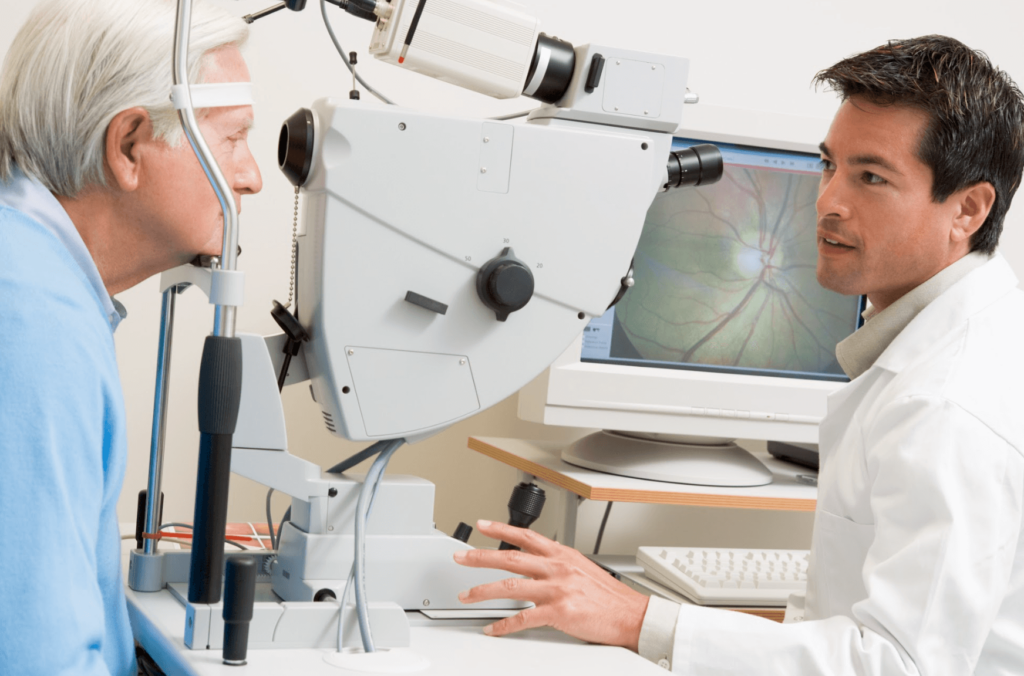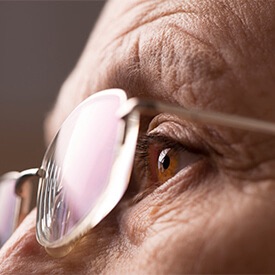Diabetic Retinopathy in Napa, CA
What Is Diabetic Retinopathy?
Diabetic retinopathy is an eye condition that damages the blood vessels in the back of the eye (the retina). Diabetic retinopathy causes the blood vessels to swell and leak, leading to the prevention of blood flow and delivery of nutrients to the eye. When these nutrients are not delivered, several ocular ailments can develop, including macular edema, retinal detachment, glaucoma, and more. Unfortunately, symptoms of this condition often do not develop until the advanced stages of the disease. This makes routine eye exams at Eye Specialists of Napa Valley very important for our local Napa, Sonoma, and St. Helena patients with diabetes.
What Are the Symptoms of Diabetic Retinopathy?
When diabetic retinopathy is in the beginning stages, no signs or symptoms are often present. As the condition progresses, patients will then begin to notice vision changes. Some of the most common symptoms of diabetic retinopathy include:
- Poor night vision
- Trouble seeing or reading faraway objects
- Blurred or distorted vision
- Color blindness or colors appearing muted
- Eye floaters or streaks in your vision
Once symptoms manifest in your eye or eyes and you have a history of diabetes, it may be time to seek treatment. Our talented team of providers is ready and available to discuss diabetic retina treatment options.
What Causes Diabetic Retinopathy?
Diabetic retinopathy is a complication of diabetes that gradually blocks or damages the small blood vessels surrounding the retina. If not properly managed, this condition can lead to diabetic macular edema (DME), causing blurry vision, or neovascular glaucoma, which can result in blindness. Key causes and risk factors for developing diabetic retinopathy include:
- High blood pressure
- Elevated cholesterol levels
- Poor blood glucose control
- Unmanaged diabetes
- The use of tobacco products
What are the risk factors for diabetic retinopathy?
Diabetic retinopathy is closely linked to both the duration and the control of diabetes. The primary risk factors include long-standing diabetes, poor blood sugar control, high blood pressure, high cholesterol, tobacco use, and being overweight. Individuals with both type 1 and type 2 diabetes are at risk, with the likelihood and severity of retinopathy increasing the longer a person lives with diabetes. Additionally, pregnancy and a family history of diabetic retinopathy can elevate the risk. These factors can cause changes in the blood vessels of the retina, leading to diabetic retinopathy. Regular eye exams and managing diabetes effectively through diet, exercise, and medication can help reduce the risk of developing this condition.
How Is Diabetic Retinopathy Diagnosed?
Diabetic retinopathy is primarily diagnosed through a comprehensive dilated eye exam. Before dilating the eyes, your ophthalmologist will assess your visual acuity, intraocular pressure, eye muscle function, pupil response, and peripheral vision. Eye drops will be used to dilate your pupils, allowing your ophthalmologist to examine the inside and outside parts of your eyes. The eye drops used to dilate your pupils may cause blurry vision, but this effect will wear off in the hours following your appointment.
How Is Diabetic Retinopathy Treated?
Diabetic retinopathy has two stages, non-proliferative (earlier stage) and proliferative (advanced stage). Symptoms can include blurry vision, dark spots, floaters, and vision loss. Our team will begin with a comprehensive eye exam. Diabetic retinopathy can be well-managed with a multi-modal approach. At Eye Specialists of Napa Valley, we use a variety of diabetic retinopathy treatments in Napa, CA, including eye injections and lasers. When we perform laser treatment, one of our board-certified doctors will focus a laser beam on the retina. The laser can decrease the growth of new blood vessels that are detrimental to your vision. The eye injections decrease retinal swelling as well as decrease the growth of unnecessary blood vessels. These procedures take between 15 – 30 minutes to complete, after which you may experience some redness and/or irritation. We often schedule a follow-up to check your progress and healing. It is also extremely important to manage your diabetes with your primary care provider and keep up with your scheduled eye exams.
What to Expect After Diabetic Retinopathy
After treatment for diabetic retinopathy at Eye Specialists of Napa Valley in Napa, CA, you may experience mild redness, irritation, or blurred vision in the treated eye, but these symptoms typically improve within a few days. It’s important to avoid rubbing your eyes, use any prescribed eye drops as directed, and attend all follow-up appointments to ensure proper healing. Managing your blood sugar, blood pressure, and cholesterol remains essential to support your eye health. Our vision professionals are committed to personalized care and will closely monitor your progress. If you notice sudden vision changes or new symptoms, contact our Napa, CA office promptly to protect your sight.
Diabetic retinopathy FAQ
What are some common diabetic retinopathy symptoms?
Some of the symptoms can include impaired color recognition, dark or empty spaces in vision, eye floaters, vision loss, and blurred vision. If you’ve experienced any of these symptoms, connect with one of our eye specialists to schedule a comprehensive eye exam.
Is it possible to reverse diabetic retinopathy?
There is no known cure for this condition. However, with diabetic retinopathy treatment in Napa, CA, our eye specialists can preserve the remaining vision. It may be possible to restore some lost vision in certain cases. For more information, contact our team.
Once diagnosed, can I do anything to slow the condition?
With diabetic retinopathy, it is important to maintain near-normal blood sugar, blood pressure, and cholesterol levels so that it doesn’t get worse. This will help you slow the progression of the disease.
Is surgery an option?
While you can undergo surgery, it is typically not recommended until you suffer severe vision loss and bleeding into the eye. If you’re experiencing these diabetic retinopathy symptoms, schedule an appointment so that our team can go over your options.
Can diabetic retinopathy cause blindness?
Yes, if left untreated, diabetic retinopathy can lead to severe vision loss or blindness. Early detection and treatment are crucial.
How often should diabetics get an eye exam?
People with diabetes should have a comprehensive eye exam at least once a year or more frequently if their doctor recommends it.
Prevent Diabetic Retinopathy
For diabetic patients, maintaining eye care and proper control of their blood sugar level is important since anyone with diabetes can develop diabetic retinopathy. Identifying this condition early on can help preserve your vision and reduce damage to the retina. If you have diabetes, schedule a comprehensive eye exam at Eye Specialists of Napa Valley to determine if you have this condition or to understand your diabetic retinopathy symptoms. We can help with state-of-the-art treatments such as laser surgery or eye injections. For more information, contact our Napa, CA office today.
Related Posts
Vision Matters: Empowering Those with Diabetes to Protect Their Eyesight
*Individual results are not guaranteed and may vary from person to person. Images may contain models.




